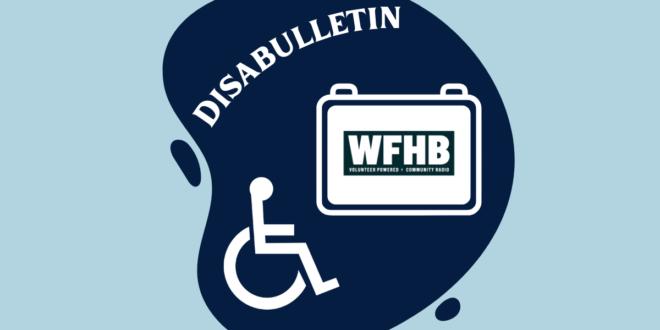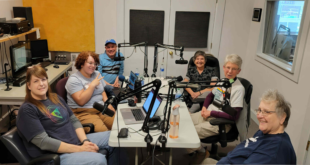Podcast: Play in new window | Download (Duration: 9:49 — 9.0MB)
Subscribe: RSS
Good evening, i’m Abe Shapiro and this is Disabulletin, where we cover the top stories impacting the disability community across the country and around the world.
We’re back after a lengthy research sabbatical to bring you the latest in disability news. We start tonight’s installment by reviewing the developments of our previous story out of White Plains, New York.
It’s the Civil Action case of Westchester Disabled On The Move (WDOMI) against the rideshare company Lyft over an alleged lack of Wheelchair Accessible Vehicles. The original lawsuit was filed in 2017 by Harriet Lowell, on behalf of individuals with mobility disabilities who are “pervasively and systematically excluded from Lyft’s convenient transportation services as Lyft does not provide Wheelchair Accessible Vehicles in White Plans, where Lowell is located.”
Following our interview with WDOMI attorney Jeremiah Frei Pearson and plaintiff Lowel a hearing was held on August 31 presided over by Judge Philip M. Halpern, who scheduled the next court date for December 12, when a trial date will be set. As the date of the next hearing nears, Disabulletin hopes to bring Mr.Frei Pearson, WDOMI, and Harriet Lowell back on the show for further details.
For the first time ever, a major airline plans to give travelers with disabilities a tool to help them find accessible flights.
On September 28, United Airlines announced it will be offering travelers with disabilities a new accommodation on its website to ensure a better traveling experience. By entering the exact dimensions of their wheelchair with the tool, passengers in wheelchairs can better determine which flights feature doors large enough to accommodate their mobility devices.
Other reforms include reimbursing the cost of travelers when flights offering improved accessibility are more expensive than the traveler’s original flight, specialized seating at terminals for passengers with damaged wheelchairs or are waiting for their wheelchairs after a flight.
These reforms were announced following United’s concluding of negotiations with the U.S. Department of Transportation concerning a 2022 complaint from one Engracia Figuroa. Figuaroa’s motorized wheelchair was damaged during a 2021 United flight, after which she was forced to sit in an inaccessible wheelchair for hours after landing. Figuroa’s attorney argued the incident caused injuries leading to Figueroa’s death three months later.
On Sept. 12, Senators Sherrod Brown of ohio and Bill Cassidy of Louisiana proposed the SSI Savings Penalty Elimination Act to raise the limits for the first time in 39 years
This legislation comes as the Social Security Administration (SSA) is attempting to reclaim billions sent to the nation’s elderly and disabled populations, which were never meant for them.
According to a 2022 report by the SSA’s Inspector General Report, “the department recalled $4.7 billion of overpayments, but $21.6 billion was unaccounted for.”
Overpayments often result from the SSA making an error in the process of examining a beneficiary’s application or from beneficiaries themselves failing to comply with requirements.
If beneficiaries have already spent the money they were overpaid, SSA will require the beneficiary to pay back the money they were overpaid by halting or decreasing monthly benefit payments, garnishing wages, or halting tax refunds intended for beneficiaries until the money is paid back.
Such strategies by the SSA can cause undue hardship for the beneficiary,
SA officials cite complex rules, incorrect data regarding income limits for Social security beneficiaries, and inadequate staffing as the reasons for why overpayment continues to occur
The general boundary for an eligible beneficiary of Supplemental Security income, or government assistance to individuals with disabilities in poverty is $2000 in assets for Individual and $3000 for couples, though such limits haven’t been adjusted for inflation since 1984.
Also last Thursday, The U.S. Department of Labor announced it will be examining what is known in the disability community as the Section 14(c) program. In 1938, The Fair Labor Standards Act was passed, setting minimum wage for the first time in US History.
According to the law, employers of persons with disabilities may submit an application for 14c special certificates from the department permitting them to pay said persons a salary less than the federal minimum of $7.25 per hour.
According to an October 1st article by Disability News service DisabilityScoop, “such a review comes at the urging of disability advocates and other entities including the Government Accountability Office, the National Council on Disability, the U.S. Commission on Civil Rights and the Labor Department’s Advisory Committee on Increasing Competitive Integrated Employment
In 2014, President Obama signed the Workforce Innovation and Opportunity Act that stipulated paying people with disabilities below the federal minimum could only be implemented if prior options for vocational rehabilitation, or training individuals with disabilities before graduating high school, were unsuccessful.
According to a report from the GAO issued this year, “workers with disabilities across the country earning subminimum wage has dropped from 296,000 to 122,000 between 2010 and 2019.”
And just last month, statistics from the Department of Labor found that number has now dropped below 43,000 following 16 states passing legislation not only limiting but prohibiting the practice of sub minimum wage.
The National Institutes of Health says it will officially designate people with disabilities as a health disparity population.
The label applies to groups that “experience significant disparities in their rates of illness, morbidity, mortality and survival, driven by social disadvantage, compared to the health status of the general population,” the NIH said.
And our final story today takes us to the highest courtroom in the land, where the holy grail of Disability Civil Rights, The Americans With Disabilities Act or ADA is under judicial scrutiny once again. The case is Acheson Hotels, LLC v. Laufer and asks whether individuals with disabilities have the right to file a lawsuit against a business under the ADA if they do not visit it.
The plaintiff in this case is one Deborah Laufer of Florida, who has a vision impairment requiring usage of a cane or wheelchair.
Laufer is what is known as a “tester” in the disability civil rights community, or someone who investigates ADA violations to bring legal action and has filed over 600 federal lawsuits since 2018 making allegations against hotel owners and operators similar to the ones brought against Acheson Hotels.
The case dates back to September 2020, when Ms.Laufer first filed in the US District Court of Maine. While attempting to visit reservation websites for two hotels operated by Acheson, Laufer discovered that the sites did not provide adequate details regarding ADA-accessibility at the hotels.
Laufer argues she has grounds to sue based on two portions of the ADA. First, Title III, which reads, “n]o individual shall be discriminated against on the basis of disability in the full and equal enjoyment of goods, services, facilities, privileges, advantages, or accommodations of any place of public accommodation by the proprietor of said public accommodation.” Places of public accommodation include hotels. Enforcement falls to the US Department of Justice, which has drafted regulations to ensure such enforcement.
The regulation, known as the Reservations rule stipulates that hotels “with respect to reservations made by any means,” must “[i]dentify and describe accessible features in the hotels and guest rooms offered through its reservations service in enough detail to reasonably permit individuals with disabilities to assess independently whether a given hotel or guest room meets his or her accessibility needs”
The Supreme Court must now decide whether or not Ms.Laufer has what is known as Article III standing under the US constitution. Under such standing, Ms.Laufer would need to satisfy the following three standards: That she suffered a concrete injury, that such injury resulted from the defendant’s actions, and that such injury will be fully resolved should the court rule in the plaintiff’s favor, the plaintiff in this case being Ms.Laufer.
On the other side, Acheson asks the court to dismiss Laufer’s case for “lack of standing, since Laufer had no intention of staying at their hotels and was therefore not injured. Previously, this argument was sufficient enough that the district court of Maine dismissed Laufer’s case, after which she appealed.
In the coming days, Disabulletin will cover the arguments made on both sides of the courtroom.
Abe Shapiro WFHB News live and learn
 WFHB Bloomington Community Radio
WFHB Bloomington Community Radio


